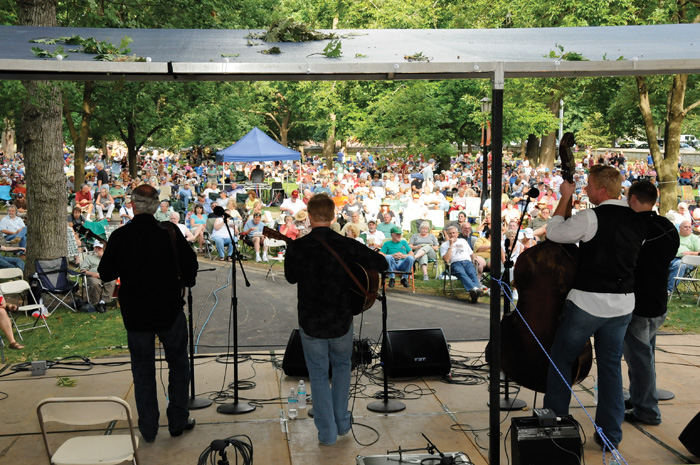20 Years of Bluegrass on the Grass

Dickinson will host the 21st annual Bluegrass on the Grass Festival on Saturday, July 9, from noon to 8 p.m. on the John Dickinson Campus, West High Street between West and North College streets. The event is free and open to the public and will be held rain or shine.
Originally published in the spring 2015 issue of Dickinson Magazine, the article below takes a look back at the beloved music festival's two-decade history.
by Sasha Shapiro '15
On a hot, sticky day in July 2008, having just arrived in Carlisle to start his new job as assistant professor of political science, Andrew Wolff was unpacking with his apartment windows ajar. Thin strands of fiddle and banjo riffs floated in along with the hot summer air. “There’s bluegrass playing!” Wolff exclaimed. Abandoning the task at hand, he followed the melody until it brought him to Dickinson’s academic quad, where more than 3,000 people were sprawled across the lawn listening to live bluegrass. Children ran through the sea of blankets and tents, dogs retrieved Frisbees and music-lovers nodded to the ballads while nibbling on pizza and hot dogs.
1995: Davis Tracy’s Country Bob and the Barbeque Boys play on the Weiss Center lawn, and Bluegrass on the Grass is born.
Seven years later, Wolff, as the festival’s assistant director, is helping Bluegrass on the Grass celebrate its 20th anniversary on July 11. Families and enthusiasts from all points north and south make the trek every summer to reunite with friends, relax in the shade and enjoy the festival. “With bluegrass, you really meet friends,” says Wolff. “It’s a really pure music. The themes are something you can relate to, kids can listen to it too, [as well as] grandparents, so there’s a whole range of appeal. It’s a real community event in that way.”
Ryan Sarno ’09, a former WDCV-FM DJ and festival volunteer, agrees. “It is rewarding to dive into bluegrass,” he says. “With deep, familiar traditions, uncomplicated forms, freight-train energy and virtuosic—but contained—improvisation, the music is both accessible and very rich.”
For 20 years, the unofficial house band has been the Dismembered Tennesseans.
The festival is welcoming back several bands that have been playing since its infancy, such as the Dismembered Tennesseans, who over the years have become known as the “house” band. “We want some old-timey bands that play the greats like Lester Flatt and Bill Monroe, but we always like to have young up-and-coming bands that stretch the boundary [as well as other bands] that are doing their own albums,” says Wolff.
The festival’s planning committee is composed of avid bluegrass fans from among Dickinson’s faculty and alumni, as well as bluegrass enthusiasts from within the Carlisle community.
Founder and director Davis Tracy has always believed in creating a way in to the bluegrass genre by honoring past musical traditions and recognizing present talents. The former director of the Counseling Center was known for his popular Friday-afternoon bluegrass show on WDCV-FM. His eclectic line-up included old-time bands that he claims precede traditional bluegrass, as well as bands with electric guitars and drums that push the genre’s boundaries.
Since 1998 Martin Guitars has donated 15 guitars to the festival.
And it was through this radio show that Wolff became acquainted with Tracy. “On Friday afternoons I would turn on [the radio] and do my work while listening to bluegrass, so I loved his show,” says Wolff. Tracy also was known around town for music parties that he hosted in a restored barn on his farm outside of Carlisle. Many agree that it was Tracy who turned them onto bluegrass.
“Thanks in large part to Tracy, the Carlisle area is a bit of a bluegrass oasis,” Sarno says. “He brings such energy to the festival and its music.”
Along with the festival’s growth, its cuisine has evolved to include authentic Thai food and wood-fired pizza.
Tracy points to ongoing support from the Carlisle and Dickinson communities as a major factor in the festival’s success. Dickinson originally provided the seed money through its Chautauqua summer music series, as well as facility maintenance and equipment support. Local food vendors, including the College Farm, set up tents along the edge of the quad. Artists showcase their work and enthusiastically share their products with the festival-goers.
“Bluegrass is a folk music, so a gathered community of people is its heart,” Sarno says. “The music is a way for us to participate in the communities that preceded us, a way to receive community and pass it down to the next generation.”
Read more from the spring 2015 issue of Dickinson Magazine.
Learn more
- "Turning the Campus Blue"
- Bluegrass on the Grass
- Life at Dickinson
- Dickinson College Farm
- Latest News
Published September 20, 2015